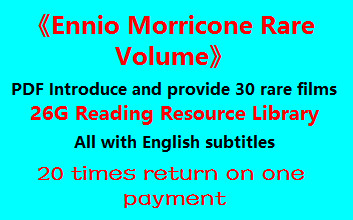Original Review by Jonathan Broxton
Baarìa may well be the first instance of a director – in this case Giuseppe Tornatore – making a film about what is effectively his own life story. The film is a reflection and love letter to the island of Sicily, and depicts two childhood friends, Peppino and Mannina, who grow up to be lovers. The story spans three generations, from the 1920s to the present day, and is set in the town of Bagheria (known as Baarìa in Sicilian dialect), where Tornatore grew up. The film stars Francesco Scianna and Margareth Madè, and has an original score by the legendary Ennio Morricone, who has been Tornatore’s musical muse for over 25 years, through films such as Cinema Paradiso, Stanno Tutti Bene, The Starmaker, The Legend of 1900 and the Oscar-nominated Malèna.
Despite being 81 years old, Morricone’s talent shows no sign of waning. The 10-minute “Sinfonia per Baarìa” is a quintessential Morricone piece, romantically sweeping with prominent strings, dancing woodwinds, and the familiar lyrical chords, but interspersed with the moments of dissonance that make his music so unique and compelling. New additions to the canon in this score’s case are the lamenting male vocalist intoning over the music in what I assume to be the Sicilian dialect, and the subsequent ethnic woodwind writing which gives the theme a distinct North African flavor. Unfortunately, the later half of the cue is rather oddly obscured by various dialogue clips and sound effects, including trains, chickens and waves lapping, which does spoil the mood somewhat, but thankfully all the main material is re-stated in the meat of the underscore itself.
There is some truly soaring music to be heard in this score; cues such as “Baarìa”, “Brindisi” and “Racconto di Una Vita” are heart-meltingly gorgeous, and showcase Morricone’s unashamedly emotional thematic writing at its very best. The music becomes wistful, almost idyllic, during “Il Corpo e la Terra” and “Un Gioco Sereno”, both of which make use of sunny, lilting guitars and playful woodwinds. Other cues are more strident; the superb “Ribellione”, “La Visita” and “Un Fiscaletto” feature another one of the wonderfully pompous marches that Morricone has written so well over the years, while “Lo Zoppo” is a punchy action cue filled with slashing, propulsive string writing, off-kilter rhythms and howling trumpets.
It’s all really quite excellent, and highly recommended for those who have appreciated Morricone’s work over the years. Quite how much longer Morricone can go on is unknown; according to the Internet Movie Database, Baarìa is the 492nd project in a long and illustrious career that stretches back to 1959, and if he were to stop now he would have left one of the most indelible marks on the cinema of any composer in history. But, if after almost 500 scores and 40 years, he can still write music as beautiful and engaging as that heard in this score, I hope it never ends.
Rating: ****
Track Listing:
- Sinfonia per Baarìa (10:59)
- Ribellione (3:32)
- Baarìa (2:27)
- Il Corpo e la Terra (2:35)
- Lo Zoppo (0:59)
- Brindisi (3:02)
- Un Gioco Sereno (2:16)
- La Visita (2:47)
- Un Fiscaletto (1:28)
- Racconto di Una Vita (3:27)
- La Terra (1:51)
- Verdiano (1:48)
- Baarìa (performed by Banda Musicale dell’Arma dei Carabinieri) (3:11)
- Oltre (performed by Banda Musicale dell’Arma dei Carabinieri) (1:15)
- Prima e Dopo (performed by Banda Musicale dell’Arma dei Carabinieri) (2:25)
- I Mostri (1:58)
- L’Allegro Virtuoso di Zampogna (2:23)
- A Passeggio Nel Corso (2:50)
- Il Vento, Il Mare, I Silenzi (2:23)
Running Time: 53 minutes 36 seconds
Image Music 0201482IMA (2009)












